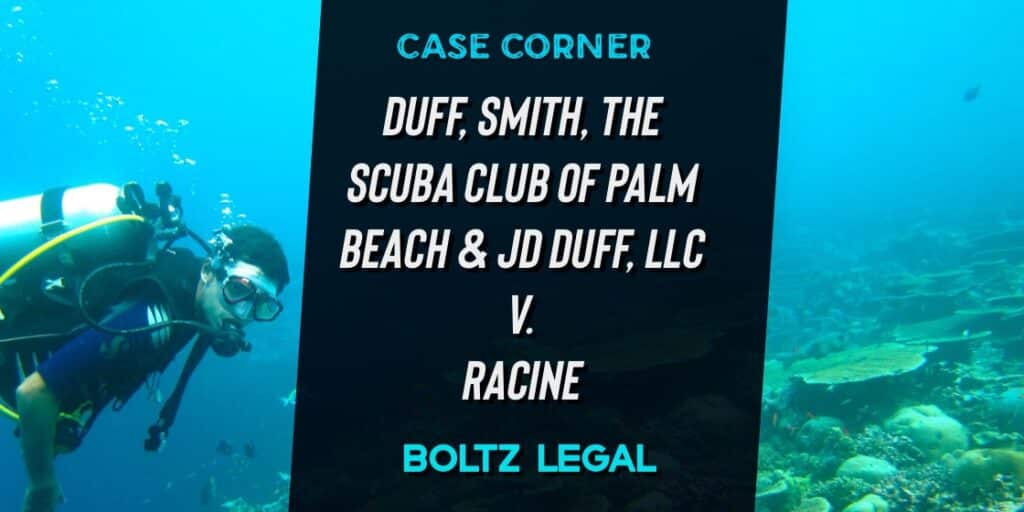JD DUFF a/k/a JONATHAN DUFF, LUCAS SMITH, THE SCUBA CLUB OF PALM BEACH, and JD DUFF, LLC v. GILLIAN RACINE, as personal representative of the ESTATE OF ALEXIS NICOLE RACINE
Jurisdiction: Fourth District Court of Appeal, Florida
Case No.: 4D2024-2651
Lower Tribunal Case No.: 50-2023-CA-006973-XXXX-MB
Date: June 11, 2025
Lower Court: Circuit Court for the Fifteenth Judicial Circuit, Palm Beach County, Judge Luis Delgado, Jr.
Punitive Damages Denied: Court Finds Estate Failed to Meet Heightened Standard in Diving Death Suit
In a significant reversal, the Fourth District Court of Appeal ruled that the trial court erred in allowing punitive damages claims to proceed in a wrongful death lawsuit stemming from a scuba diving incident. The appellate court found that the estate of Alexis Nicole Racine failed to present sufficient evidence of gross negligence and that the trial court had misapplied the legal standard set forth in Florida Statute § 768.72.
The Incident: Tragedy on a Charter Dive
The lawsuit originated after the tragic death of Alexis Racine, who drowned during a scuba diving tour led by dive master Lucas Smith and boat captain JD Duff off the coast of Palm Beach. The tour, operated by The Scuba Club of Palm Beach and owned by JD Duff, LLC, included six divers. During the dive, Racine became separated from the group and was later found unconscious on the ocean floor. Despite efforts to resuscitate her, she died at the hospital. Post-mortem reports showed she had alcohol and drugs in her system.
Legal Allegations and Motion to Amend
Racine’s estate initially filed suit against Duff, Smith, The Scuba Club, and JD Duff, LLC, alleging wrongful death due to professional negligence. Later, the estate sought to amend the complaint to include punitive damages based on claims of gross negligence.
Key accusations included:
- Failure to use the buddy diving system.
- Allowing the decedent out of sight for several minutes.
- Permitting the decedent to dive while allegedly intoxicated.
The trial court granted the motion to amend, permitting punitive damages claims to proceed. However, the appellate court found this decision legally flawed.
Misapplication of Florida’s Gatekeeping Standard
Florida law (Section 768.72) establishes a high bar for punitive damages, requiring plaintiffs to provide a “reasonable evidentiary basis” for such claims. The appellate court criticized the trial judge for applying a liberal pleading standard, typically used for ordinary claims, rather than the specific and rigorous requirements for punitive damages.
As the opinion noted, trial courts must act as gatekeepers—not rubber stamps—when reviewing motions to assert punitive damages. This includes a mandatory two-step analysis:
- Determining whether the proposed complaint includes legally sufficient allegations.
- Determining whether the plaintiff has produced evidence that reasonably supports the claim of gross negligence.
The trial court did neither.
No Reasonable Basis for Gross Negligence
The appellate panel thoroughly reviewed the evidence presented by Racine’s estate and concluded it did not meet the gross negligence threshold.
- Buddy System & Sight Loss: The estate’s expert cited breaches of industry standards, including failure to use the buddy system and allowing Racine out of sight. However, the court found that such actions, while possibly negligent, did not rise to the level of “conscious disregard” required to support punitive damages.
- Alleged Intoxication: Although the estate claimed Racine should not have been allowed to dive while under the influence, no evidence showed that the defendants knew or should have known she was intoxicated prior to entering the water. Smith, the dive master, testified he thought her behavior was just her personality, and multiple witnesses supported this view.
- Expert Testimony Lacked Weight: The estate’s expert’s conclusions were deemed too speculative and conclusory, with the court reminding litigants that expert opinions must assist the trier of fact, not replace them.
Vicarious Liability Claims Also Fell Short
As for the two LLC entities, the estate alleged they were grossly negligent “by and through” Duff’s actions. But Florida law requires more than agency-based pleadings for punitive damages. Under § 768.72(3), punitive damages against a corporate entity require direct involvement, ratification, or independent gross negligence.
The court found the estate failed to allege or support any such conduct by the LLCs themselves. The reliance on vicarious liability under common law was insufficient.
What This Means for Future Cases
This decision reaffirms the strict standards governing punitive damages in Florida civil litigation. It reminds plaintiffs—and trial judges—that punitive damages are not a simple extension of negligence claims. Allegations must be matched by actual evidence that indicates reckless or intentional misconduct. Failing that, the court must act to prevent speculative or emotionally charged claims from unfairly advancing.
Moreover, the case underscores the importance of procedural rigor. Even in emotionally compelling cases involving death, courts must remain committed to established legal thresholds.
Today’s Insight
“Justice without force is powerless; force without justice is tyrannical.”

